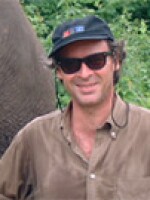RENEE MONTAGNE, host:
There's not to laugh about in Myanmar these days. The military junta there appears more interested in its own survival than that of the million and a half of its people left homeless and hungry by the cyclone. Still, some do dare to joke about the regime, as we hear in this audio postcard sent by NPR's Michael Sullivan.
Unidentified Man: (Unintelligible)
MICHAEL SULLIVAN: The Mustache Brothers are Myanmar's most famous comedy troupe, though they're not longer allowed to perform in public after one of their shows at the house of democracy icon Aung San Suu Kyi riled the generals, who, who can't take a joke.
The brothers now eek out a living performing for foreign tourists in their home in Mandalay.
Mr. LUMOU MUSTACHE(ph): (Unintelligible) why don't you come outside.
SULLIVAN: Brother Lumou does most of the talking. He warms up the crowd with a joke about a Burmese man on a trip to Thailand who goes to see a dentist. The dentist is shocked when he sees the condition of the man's teeth. Don't you have dentists in Myanmar, he asks? Yes, we have dentists, the patients replies, but we're not allowed to open our mouths.
I'd heard the joke before but it seems to have found a perfect home in Myanmar. Myanmar's military rules through fear and intimidation; informers are everywhere and people almost never talk politics in public because the prisons are packed with people who did.
The Mustache Brother Parpa Lei(ph) has been arrested three times and has spent more than seven years in the clink, up the river, in the big house, as his brother Lumou says, delighted with his own idiomatic American English. Parpa Lei smiles weakly as his brother delivers his lines but says nothing. Myanmar's prison's no joke.
Another famous comedian, the movie actor Zagana(ph), was detained last week for delivering relief supplies to cyclone survivors without the government's permission.
Fear of another sort keeps foreign aid agencies working in the country from complaining too much or too loud about the government's restrictions on aid and aid workers, even before last month's cyclone. Complain too loud and you might just be asked to leave, and then what happens to those you're already helping who may have to learn to do with even less.
Fear also colors the work we do as journalists in the country. Foreign reporters aren't welcome in Myanmar, and those of us who sneak in as tourists have to be careful not to get kicked out, and even more careful not to put the people we come in contact with at risk.
Microphones in public are out of the question; writing down people's names, taking their pictures, all become risky propositions. So fear of exposure leads to compromise. Linger too long and you may draw too much attention, but leave early and you may have to leave without the answers you came for. And sometimes it's better not to try at all.
Which is exactly what a taxi driver told me when I asked him to stop at a polling station near Mandalay the day the military held their referendum on a new constitution, even as cyclone victims struggled without food, water or shelter farther south. If I stop with you in the car, the driver said, they will know who you are and they will come to my home tonight and take me away, he said, and my family will not know where I've been taken or when I will return.
A trip to the delta, which ended with my driver and I being detained briefly, ended with him changing the license plates on his car as soon as the police checkpoint was out of sight. Fear of getting caught kept me from using the hotel phones, fearing they were tapped. Instead I used public phone booths to file my reports, careful not to visit the same place two days in a row.
My favorite was a hole-in-the-wall run by an older woman who spoke no English. I spoke no Burmese, but we made do. On that last day, though, when she saw me approach, the usual smile and greeting were gone. Instead, she picked up a piece of paper folded neatly on a nearby table and handed it to me. And written on it in perfect English was this: I beg your pardon. I am very, very sorry, but please don't come back here again.
I handed the note back to her, mortified, thinking about the trouble I may have caused, but there was no way to explain, and her face made clear I shouldn't try.
(Soundbite of music)
MONTAGNE: That was an audio postcard from Myanmar from Michael Sullivan. Transcript provided by NPR, Copyright NPR.






